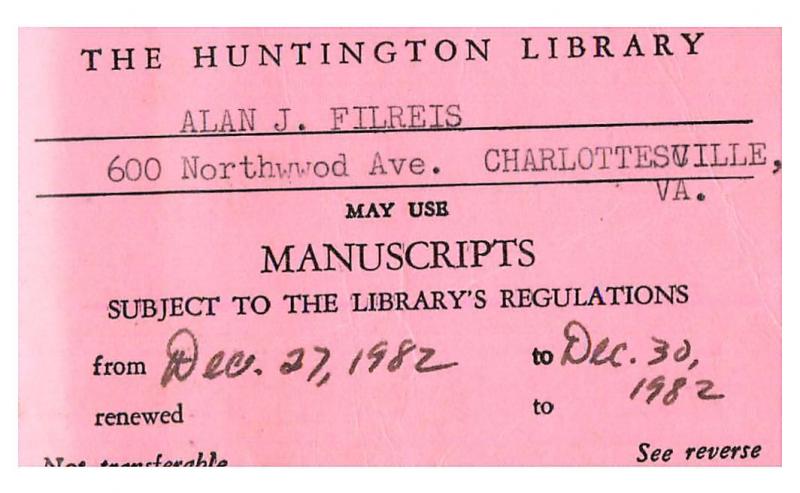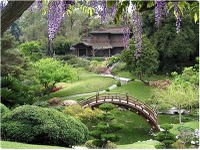Scholar in Paradise
At the Huntington Library
 In my basement I found a water-warped address book dating from the period 1978-1985. This morning I went looking for a few old addresses, picked up the little half-rotted black codex and out fell a pink card, which brought back a flood of good memories. It's a researcher's card given to me on the occasion of my very first visit to an archive of literary manuscripts: the Huntington Library, December 1982. Virginia (Ginny) Renner was the readers' services librarian who immediately befriended me. Dave Wyatt took me there (MLA was in LA that year, I think); we visited his father in Laguna Beach and he escorted me around and across the LA of his youth. At the Huntington, as I read the unpublished correspondence of Wallace Stevens, I got to know Stuart Curran and Joe Wittreich, who were enormously generous and hospitable, knew the Huntington and Pasadena like the backs of their hands. And I met Marjorie Perloff for the first time, who sat next to me reading Stevens' WW2-era letters for a paper she was writing arguing his social and political ignorance. Marjorie and I enjoyed several long lunches together at the researchers-only cafe to which at noon the readers were sent walking (they closed the library for an hour, partly to enforce the daily gatherings of the scholars). We walked past the building in which was displayed Blue Boy, through the meandering Shakespeare garden, had lunch, and walked back to our manuscripts by way of the Japanese garden with its giant hungry carp
In my basement I found a water-warped address book dating from the period 1978-1985. This morning I went looking for a few old addresses, picked up the little half-rotted black codex and out fell a pink card, which brought back a flood of good memories. It's a researcher's card given to me on the occasion of my very first visit to an archive of literary manuscripts: the Huntington Library, December 1982. Virginia (Ginny) Renner was the readers' services librarian who immediately befriended me. Dave Wyatt took me there (MLA was in LA that year, I think); we visited his father in Laguna Beach and he escorted me around and across the LA of his youth. At the Huntington, as I read the unpublished correspondence of Wallace Stevens, I got to know Stuart Curran and Joe Wittreich, who were enormously generous and hospitable, knew the Huntington and Pasadena like the backs of their hands. And I met Marjorie Perloff for the first time, who sat next to me reading Stevens' WW2-era letters for a paper she was writing arguing his social and political ignorance. Marjorie and I enjoyed several long lunches together at the researchers-only cafe to which at noon the readers were sent walking (they closed the library for an hour, partly to enforce the daily gatherings of the scholars). We walked past the building in which was displayed Blue Boy, through the meandering Shakespeare garden, had lunch, and walked back to our manuscripts by way of the Japanese garden with its giant hungry carp . Thanks, Dave; thanks Stuart; thanks Marjorie. Thanks to the late Holly Stevens who sold her father's letters to the Huntington in part because he and wife Elsie had stopped to see Henry Huntington's collection on the way back from their trip through the Panama Canal and up the west coast. Yes, I did note that Marjorie sat next to me researching a paper on Stevens' wartime political ignorance (and/or obliviousness). What I didn't mention--but those who have read my scholarly writing will already know--was that I was beginning to write a book arguing precisely the opposite. This did not put Marjorie off. In fact, quite the opposite. It endeared me to her and was the basis of the beginning of our friendship. We argued, to be sure, but in a way I found utterly productive (and perhaps she felt the same). She was the first energetically open-minded member of my profession I had met. We were teaching each other the conflicts. I'm going back to that first book to be sure I acknowledged her in this way. It's been a while. And in any case, now I've done so here.
. Thanks, Dave; thanks Stuart; thanks Marjorie. Thanks to the late Holly Stevens who sold her father's letters to the Huntington in part because he and wife Elsie had stopped to see Henry Huntington's collection on the way back from their trip through the Panama Canal and up the west coast. Yes, I did note that Marjorie sat next to me researching a paper on Stevens' wartime political ignorance (and/or obliviousness). What I didn't mention--but those who have read my scholarly writing will already know--was that I was beginning to write a book arguing precisely the opposite. This did not put Marjorie off. In fact, quite the opposite. It endeared me to her and was the basis of the beginning of our friendship. We argued, to be sure, but in a way I found utterly productive (and perhaps she felt the same). She was the first energetically open-minded member of my profession I had met. We were teaching each other the conflicts. I'm going back to that first book to be sure I acknowledged her in this way. It's been a while. And in any case, now I've done so here.